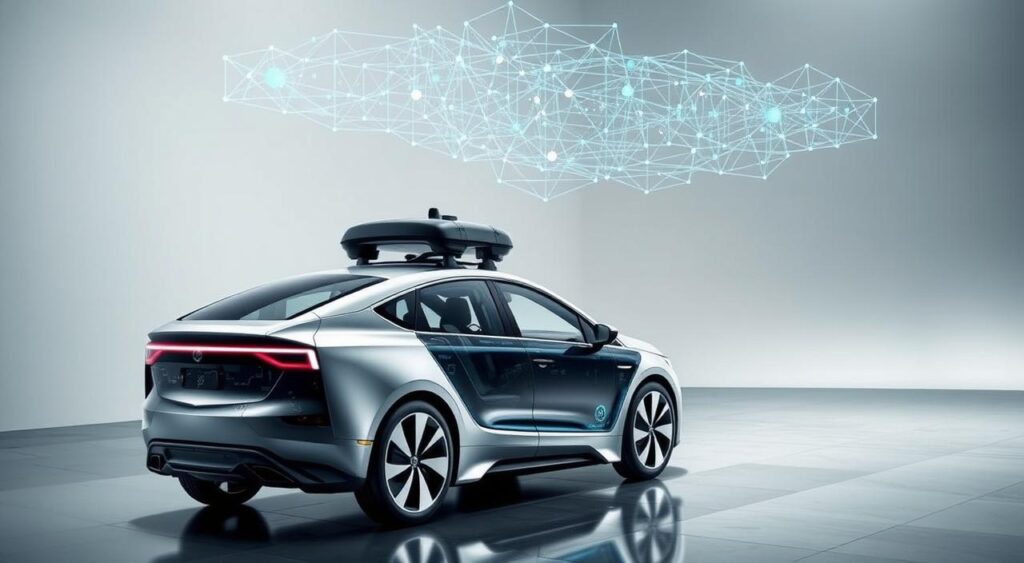Did you know India’s electric vehicle (EV) market is growing fast? It’s expected to grow by 49% every year. This could make it worth $150 billion by 2030.
This growth shows India wants to use green transport more. The country is trying to get big car makers to come and work there. India’s new EV policy is a big step towards this goal.
The Narendra Modi government is excited to share this plan. They want companies from all over to join in. This move could be good for both the companies and the people who buy cars.

Understanding India’s Flagship EV Making Policy
The India EV strategy wants to change the electric vehicle industry in India. It does this by attracting global automakers with a new EV policy. This policy helps make EVs in India, reducing imports.
Overview of the Policy
India is making it easier for companies to invest in electric vehicles. The policy lowers import duties for companies that make EVs in India. This means a big duty cut for EVs over $35,000, if they invest a lot locally.
Key Features of the Policy
The policy makes sure companies follow local rules. New companies must invest a lot in India. They have to meet certain revenue goals to avoid penalties.
Government Initiatives and Incentives
The government is helping with this policy. They offer financial help to encourage making EVs in India. This helps India grow its EV industry and meet global goals.

India to Open Flagship EV Making Policy to Lure Global Giants
India is making a big move to get more electric cars made there. They want to attract big companies from around the world. They’re giving great deals to make it easy for companies like Tesla and BYD to come.
Targeted Industries and Players
This plan is for companies that want to invest in electric cars in India. The country has many car makers already. This could mean more competition or even working together for new companies.
Challenges for Global Investors
Even though it sounds good, there are some big problems. Companies might not want to make cars in India because of rules. Also, some electric bike makers had trouble following rules before. This makes some investors worry.
Examples of Global Interest
But, many companies are excited about India. VinFast is setting up shop, showing they believe in India. This shows that even with problems, India is a place to watch for electric car makers.

Conclusion
India’s EV policy is a big step towards becoming a leader in electric cars. The government’s help, growing demand, and foreign investment will shape the future. These factors are key to making cars cleaner and greener.
India aims to sell and make more electric cars. To reach these goals, clear policies and strong commitment are needed. It’s important to balance the chances and risks of investing in India’s EV sector.
India’s EV market is growing and full of chances for new ideas and growth. By focusing on electric cars, India helps itself and attracts global interest. This change is a chance for you to help make India’s transport system better for the future.
FAQ
What is India’s flagship EV making policy?
India’s EV making policy is a big push by the government. It wants to draw in global car makers with special perks. The goal is to grow EV making in India and cut down on imports.
What incentives are offered to manufacturers under this policy?
Car makers get big breaks on customs duties. For example, EVs over $35,000 get a 15% duty cut. But, they must invest a lot, around $500 million.
Which global automakers are targeted by this policy?
The policy is for big names like Tesla and BYD. It wants them to make cars in India under good terms.
What challenges do global companies face in India’s EV market?
Companies face tough local making rules. There’s also doubt about following these rules, based on past issues. Plus, they face strong competition from Tata and Mahindra.
How does this policy relate to India’s sustainability goals?
The EV policy is part of India’s big plan to go green. It aims to make transport cleaner and greener.
Are there any examples of global companies already investing in India’s EV industry?
Yes, VinFast is setting up shop in India. It shows both the interest and worries about investing here.
What is required from manufacturers to receive the incentives?
Makers must meet big investment and sales targets. They have to do this within certain times. If they fail, they might face fines.
How will the policy impact the future of electric vehicles in India?
The policy will help grow India’s EV market. It will bring in more foreign money and push for green cars. But, it will also face some big challenges.
Joni has been an ECT News Network columnist since 2003. His areas of interest include AI, autonomous driving, drones, personal technology, emerging technology, regulation, litigation, M&E, and technology in politics. He has an MBA in human resources, marketing and computer science. He is also a certified management accountant. Enderle currently is president and principal analyst of the Enderle Group, a consultancy that serves the technology industry. He formerly served as a senior research fellow at Giga Information Group and Forrester. Email Rob.




